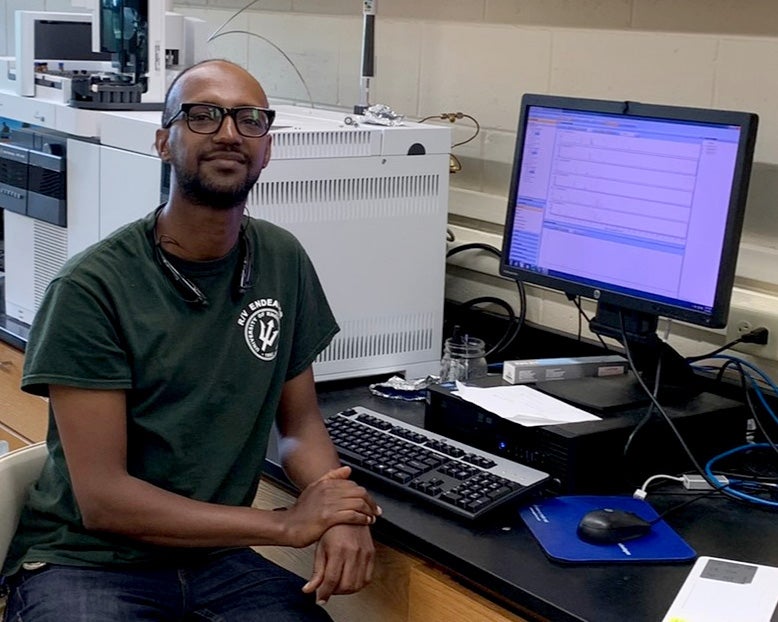July 12, 2022
Asta Habtemichael, a Ph.D. candidate at the University of Rhode Island Graduate School of Oceanography, was recently chosen as one of 20 environmental scholars to receive a Switzer Environmental Fellowship. The prestigious fellowship, a program of the Robert and Patricia Switzer Foundation, recognizes promising environmental leaders and provides $17,000 to support their research.
Habtemichael’s research focuses on a family of contaminants called per- and polyfluoroalkyl substances (PFAS). Used as water repellents and flame retardants, PFAS permeate the blood of 98 percent of Americans and nearly every habitat on Earth, yet there are large gaps in understanding the occurrence and effects of these contaminants.
“I was introduced to PFAS when I started my graduate study at URI,” said Habtemicahel, who earned a bachelor’s degree from the College of Marine Science and Technology in his home country of Eritrea. “The more I read about these chemicals the more intrigued I became. Most of all the gap in knowledge for the bioaccumulation and biomagnification behaviors of these chemicals drew my attention.”
After earning a master’s degree through URI’s Department of Marine Affairs in 2019, Habtemichael jumped at the opportunity to work with Professor of Oceanography Rainer Lohmann on a PFAS project. Habtemichael has since become a trainee in the Sources, Transport, Exposure & Effects of PFAS (STEEP) Superfund Research Program at URI, led by Lohmann.
“I was so excited to work on a new project that would contribute toward an issue that I keep dear to my heart: food and health security of local and indigenous communities, who are disproportionately affected by environmental pollution,” he said. “It was a heartbreaking moment when I learned about the connection between indigenous food sources and PFAS exposure, and the related public health disaster for indigenous communities that depend on these food sources.”
Central to Habtemichael’s work are inclusive science, education and communication practices that integrate local and indigenous knowledge into scientific research. His goal is to create mutually beneficial research projects that empower underrepresented communities to be agents of change for their own coastal and marine environmental challenges, without sacrificing their core cultural tenets. “I believe the end result of such science should be the betterment of life for local communities, and in all my work I strive to connect to such goals,” he said.
During their fellowship year, the 2022 Switzer Fellows are supported in cultivating their personal leadership skills toward advancing social equity, and will complete an intensive policy engagement training that culminates in developing relationships and sharing expertise with decision-makers at the local, state and federal levels. Habtemichael will join a Switzer Fellowship Network of over 700 fellows located across the country and around the world.
“The invaluable part of the fellowship is access to a wealth of professional development and collaborative opportunities with national and international environmental leaders throughout the Switzer Network,” said Habtemichael.
Fellows are supported throughout their careers to pursue interdisciplinary and collaborative work, positioning them for leadership in the nonprofit, government, philanthropic, business and academic sectors.

